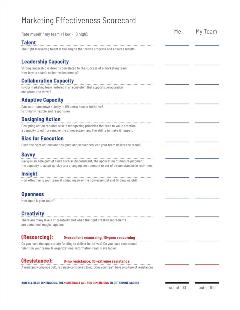Is your marketing organization right for an in-house agency?
In-house agencies are not a new phenomenon, however the surge in recent years is notable. The report that set the topic ablaze across LinkedIn and other sites was most likely the 2018 Association of National Advertisers’ report, “The Continued Rise of the In-House Agency,” which provided a survey of more than 200 client-side marketers in the U.S. It showed that in-house agencies increased among companies to 58%, from a similar survey conducted 10 years prior.
Granted, that report is from the U.S., but many organizations such as RBC, TD Bank, Canada Goose and Scotiabank are also seeing success with in-housing in Canada. These are well-established brands, but some newer Canadian brands like jewelry brand Mejuri or legal software start-up Clio, have had in-house creative and other roles since their inception. Many organizations succeeding with in-housing also work closely with a number of agency partners. The balance of internal versus external work repeatedly comes up as a key point of consideration for success, as does the internal culture to support an agency mindset.
There are perceived benefits and risks for an in-house model, and over the next little while, we will open a dialogue about what’s working and what others can learn from their experiences as they consider bringing talent under one roof – their own. This article is the start of that conversation.
Perceived benefits
-
Cost
Building a team in-house can save on some costs. Even in a mixed model, many leaders have found success by considering baseline production as a place to start. As companies rebelled against what they perceived as bloated billing systems, they realized they could invest in an agency for the big idea and the big media executions, like TV, but did they need them for direct mail? For email? For their website? And why couldn’t they staff the right people to come up with the big ideas, too? Many organizations realize that the economics of staffing a full time, fully staffed agency-model team isn’t ideal for their business or its focus, but many are looking to a mixed model of internal and external agency support as a way forward as they explore expanding in-house capabilities. -
Speed
No “circling back.” No assembling staff or negotiating resourcing if team members have been reassigned. The team is ready and waiting, and they only have one client to worry about: themselves. Plus, if they’re not on a campaign, they can be producing internal facing content. -
Affinity
The team is immersed in the brand and the mission, and they have their own success tied directly to the company’s success.
Perceived risks
- Lack of innovation
Many companies rely on agencies for a fresh perspective. They often offer expertise within a sector, so they may have experience ahead of where a client is currently. Experience in other sectors, however, is often the spark that starts a new idea. - Cost -- again
Staffing a team that could include strategy, creative, media, digital, UX, etc. can become very onerous for some organizations that need specific marketing challenges solved when those challenges are not a core part of their production or operations. Then, hiring an agency can make sense as a contained budgetary consideration that is planned and paid as needed.
There’s no question that the demands on marketers and marketing teams have never been greater. So, as marketers weigh the pros and cons of in-housing, we can share an experimental model created to stress test an organization’s readiness to build their own internal team. In our work, we viewed marketing from three perspectives:
- Ecosystem
During the past year, COVID-19 has irrevocably changed the playing field for marketers and marketing. Marketers have had to shift and adapt in real-time. - Marketing teams
Highly effective marketing teams can break down and effectively distill the wide range of complexity marketers face into finite and specialized work that eventually finds its way into a comprehensive and elegant program that achieves results. This is easier said than done, and a range of leadership skills is required to achieve success. Leadership may not always be the first, or second for that matter, language of a marketer.
- Individual talent
The skills and capabilities of the individual marketer are fundamental to the marketing team and inevitably the organization’s success. This is because organizational success and the success of the marketing team is a result of leadership skills combined to drive positive organizational results.
To begin, we propose framing an effective marketing team in 10 dimensions:
- Talent
The right marketing talent is the engine that drives progress and guarantees results. - Leadership capacity
Blending a wide range of skills, personalities and aptitudes on a marketing team requires excellent leadership. Strong leadership is directly correlated to the success of a marketing team. How is your team’s collective leadership? - Collaboration capacity
An enterprise is stronger when its subject matter experts can meaningfully engage together. Without collaboration, the enterprise will weaken with complex challenges outside the scope of individual talent or initiative. Is your marketing team being nurtured in an ecosystem that supports collaboration and allows for it to thrive? - Adaptive capacity
In many organizations, change is not quick to happen and may even be resisted. Can your team move quickly to support a new idea or initiative? Are they comfortable with frequent rapid change? - Designing action
Many teams and organizations are driven to action, often having 10 top priorities. But few teams are skilled at designing the right activities in the right sequence that drive results. Designing action requires skill in recognizing priorities that lead to value creation, a capacity to edit or remove the unnecessary, and the ability to make it happen. - Bias for execution
Once the right actions are designed and sequenced, can your team deliver results? Execution is a determinant to deliver results, time after time. - Savvy
Savvy is an amalgamation of skills such as discernment, the application of mature judgment and the capacity to adapt quickly to a changing environment in real-time. Savvy is a differentiator among marketers. Does savvy reside in your team? - Insight
The ability to distill complex issues and situations into “The Nugget” is where insight lives. To derive insight is to create value. How effective is your team at stripping away the non-essential and finding insight? - Openness
The ability to be open to new ideas and new ways of doing things is very valuable. Openness is a precursor to adaptive capacity and requisite in highly fluid and ambiguous operating environments. - Creativity
Creativity is the DNA of an effective marketing team. There are many levels of creativity, but when the right creative ingredients are combined, magic happens.
Additionally, there are operational and cultural dimensions that can challenge or harm a marketing team’s effectiveness:
Resourcing
Proper resourcing, whether talent, budget, information or leadership, can create conditions for success. Do you have the appropriate funding to deliver initiatives? Do you have exceptional talent on your team? Is organizational information readily available?
Resistance
A resistant workplace culture can be considered toxic. Teams that resist ideas, leadership or new thinking create a drag on the system and can diminish results and the desired outcome.
Starting the conversation internally will require honest conversations about capacity and capability as well as an understanding about what your organization can and should prioritize. Should you outsource completely? In-house a team? Mix the two? We have created a scorecard model to help frame this conversation.
Authors:
Dylan Gerard, Appnovation
Andre Mamprin, Reality Engine
Bruce Symbalisty, CM, Reality Engine




































